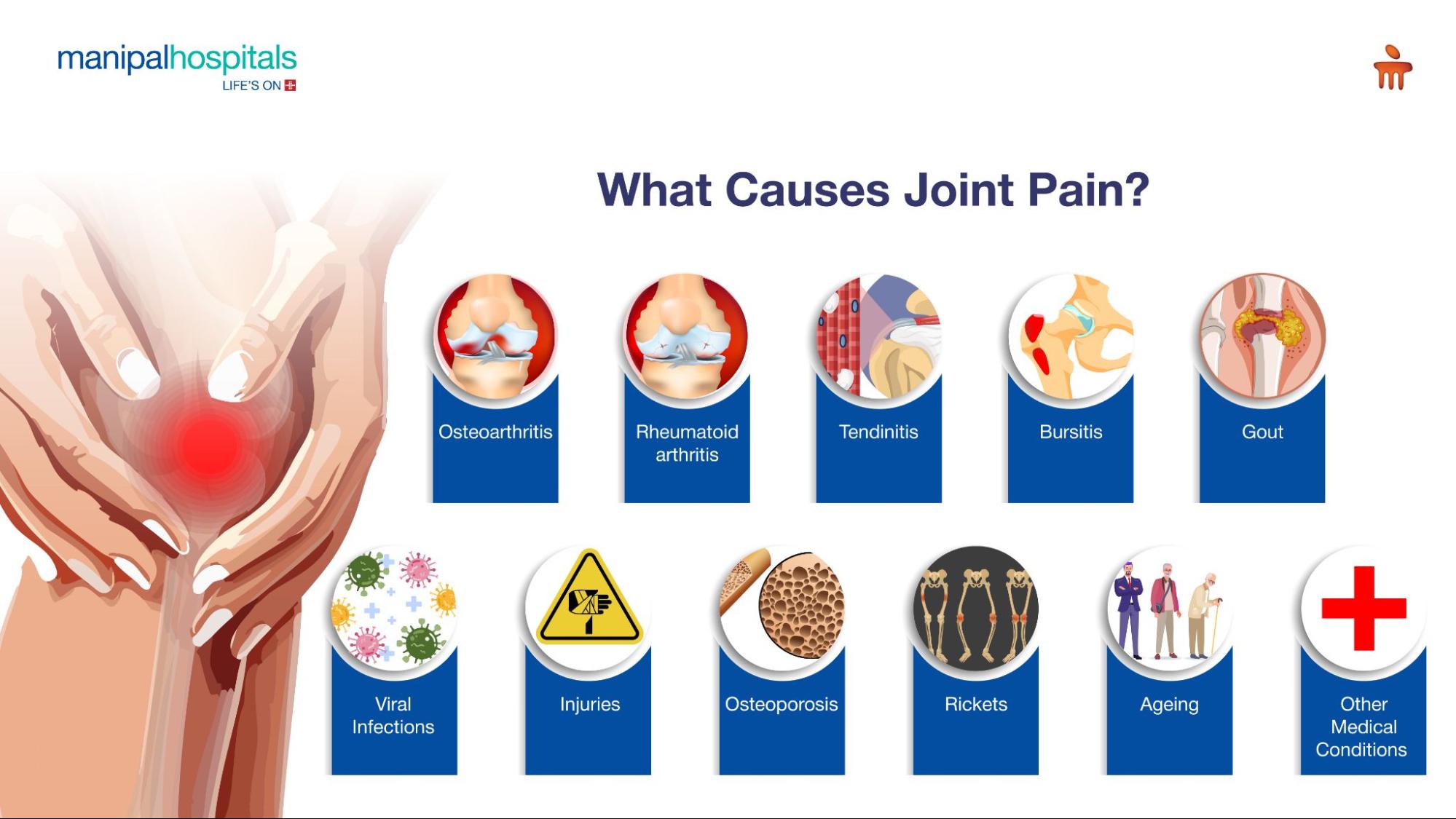Getting up after sitting for a long time and feeling pain in your knee? The next day, it’s your wrist acting up from overwork? You’re not alone. This resonates with many, as joint pain affects millions of people across all age groups and often sneaks into daily life without any prior warning. It can be occasional with less discomfort, to chronic and more intensive pain that interferes with everyday activities.
Joint pain can have many causes. But arthritis, particularly osteoarthritis, is the most common reason for chronic joint pain, affecting approximately 62.35 million people in India in 2019.1 This shows that normal-looking joint pain can be a health concern.
This blog will help you explore what causes joint pain all over the body, effective treatments available, and prevention strategies for better joint health.
Synopsis
What is Joint Pain?
Joint pain refers to the discomfort, soreness, inflammation, or ache felt in the joints of the body. A joint is the area where two or more bones meet, and the human body contains numerous such joints. The most commonly affected areas include wrist joint pain, knee joint pain, and hip joint pain. The pain can range from mild and temporary to severe and chronic. Sometimes, joints may feel sore or stiff in the morning but improve with movement, while in other cases, excessive activity can worsen the pain.
Thus, knowing what causes joint pain all over the body and getting appropriate treatment in cases of chronic pain is essential.
What Causes Joint Pain?

Numerous reasons can cause joint pain, and some can be felt in the joints throughout your body. The most common ones are:
-
Osteoarthritis, the most common, occurs due to wear and tear of the protective cushion between the bones
-
Rheumatoid arthritis, swelling and pain in the joints
-
Tendinitis, inflammation of the tendons
-
Bursitis, inflammation of the cushioning pads around joints
-
Gout, acidic crystals collect in the joint
-
Viral infections or diseases like influenza, mumps, hepatitis
-
Injuries, like sprains and broken bones
-
Rickets
-
Ageing
-
Other medical conditions like lupus, fibromyalgia, and hypothyroidism
-
Poor posture
-
Overuse of a joint
-
Sarcoidosis
-
Bone cancer
What are the Treatment Options for Joint Pain?
Joint pains are quite common, and sometimes mild cases do not require any treatment. But, if it starts affecting your daily life, getting an evaluation by an orthopaedic is crucial to get the appropriate joint pain treatment.
The joint pain treatment will depend on the underlying cause, and it mainly focuses on managing the pain and improving the function and quality of life.
-
Medications: NSAIDs, acetaminophen, corticosteroids, disease-modifying antirheumatic drugs, and certain other drugs may be prescribed by the doctor to relieve pain and reduce inflammation.
-
Topical Treatments: Creams and gels may be given to relieve pain in the affected joints.
-
Lifestyle Modifications: Managing weight, using assistive devices, activity restrictions and performing stretching exercises or low-impact workouts are helpful.
-
Physical Therapy: Heat and cold therapy can be effective in managing joint pain. Additionally, physical therapy by a physiotherapist may be recommended to improve joint mobility and strength.
-
Surgical Intervention: In severe cases, Arthroscopy, Joint Fusion, Osteotomy, and Joint Replacement surgery may be recommended.
-
Home Remedies: Some simple at-home remedies, like using a heating pad, soaking in a bathtub, resting, etc., can help too.
Can Joint Pain Be Prevented?
Though at times the joint pain may be inevitable, proactive preventive actions can lessen the risk and intensity, along with maintaining general well-being and mobility.
-
Healthy weight: Being obese puts unnecessary stress on the joints, leading to knee joint pain or hip joint pain
-
Exercise regularly: Indulge in regular low-impact exercises, strength training or flexibility exercises to strengthen your muscles, such as swimming, walking, yoga, etc.
-
Keep your body properly hydrated
-
Eat a well-balanced diet, rich in anti-inflammatory foods, calcium and vitamin D
-
Improve your posture while doing daily activities, sleeping or working on a laptop or desktop
-
Try avoiding repetitive movements and taking breaks to avoid overuse injuries
-
Use proper techniques and safety kits while playing any sport to avoid injuries
Conclusion
Joint pain is a common issue, especially in middle and old age, but it can arise from a variety of causes. Addressing joint pain early, especially when it starts to affect your daily life, ensures better outcomes and can help prevent further damage. Practicing good work ergonomics, exercising regularly, and maintaining a healthy lifestyle all contribute to long-term joint health.
If you're experiencing joint pain, take charge of your health towards a pain-free life by booking a consultation with an expert orthopaedician at Manipal Hospitals, Dhakuria, for personalised and evidence-based treatment.
FAQ's
To diagnose joint pain, our doctors will perform a physical examination and understand your symptoms and medical history to determine the cause. If needed, X-ray, MRI, or other diagnostic tests may be carried out to identify arthritis or other autoimmune disorder-related joint pain.
Immediately go to an emergency in the following conditions:
-
Experiencing severe joint pain
-
The joint becomes immobile
-
Sudden swelling occurs in the joint
-
Undergone a serious injury
-
The joint becomes deformed
The duration of joint pain will depend on its cause and the treatment. Acute conditions or injuries may resolve in a few days to weeks, while chronic conditions like arthritis require ongoing treatment to relieve pain.
Vitamin D is very crucial for the body as it helps in the absorption of calcium. When they are inadequate, the bones become brittle, and joints get susceptible to pain and injury.
You can schedule an appointment with an orthopaedician at Manipal Hospitals, Dhakuria, by contacting us or visiting our website.
Visit: https://www.manipalhospitals.com/dhakuria/specialities/orthopaedics/
Contact no: 033 6907 0001






















 6 Min Read
6 Min Read
















